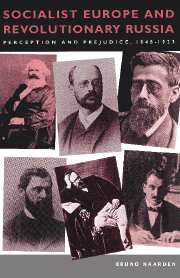Book contents
- Frontmatter
- Contents
- Introduction
- 1 The Western European image of Russia
- 2 Russian and European socialists
- 3 Russian and Western social democracy 1890–1905
- 4 1905: a failed revolution in Russia
- 5 Intermezzo 1906–1918
- 6 Socialist Europe and the October revolution 1918–1919
- 7 Social democracy in Soviet Russia and the continuation of the debate about communism in 1919–1920
- 8 1920–1921: division in the West, uprising and famine in Russia
- 9 1921–1923: the eclipse of the socialist centre in the West and the decline of democratic socialism in Soviet Russia
- Conclusion
- Notes
- Bibliography
- Index
2 - Russian and European socialists
Published online by Cambridge University Press: 16 November 2009
- Frontmatter
- Contents
- Introduction
- 1 The Western European image of Russia
- 2 Russian and European socialists
- 3 Russian and Western social democracy 1890–1905
- 4 1905: a failed revolution in Russia
- 5 Intermezzo 1906–1918
- 6 Socialist Europe and the October revolution 1918–1919
- 7 Social democracy in Soviet Russia and the continuation of the debate about communism in 1919–1920
- 8 1920–1921: division in the West, uprising and famine in Russia
- 9 1921–1923: the eclipse of the socialist centre in the West and the decline of democratic socialism in Soviet Russia
- Conclusion
- Notes
- Bibliography
- Index
Summary
Russia has been undergoing a process of Westernisation since the end of the sixteenth century, while Europe on the other hand has never been Russianised. The influence of the West on Russia is undeniably great and has been much greater than the other way round, but has continually met with resistance. The opposition to Peter the Great's reforms and the debate carried on in Russia since then about the significance of this turbulent period in Russian history are striking evidence of this. There have always been Russians who pointed out the greatness and national exclusivity of Russia to their fellow countrymen and warned them against pernicious foreign influences. In the nineteenth century these nationalist ideas were linked by Danilevsky to the expectation of an apocalyptic struggle against the hostile outside world. Yet, during his lifetime and afterwards until 1917, his fatherland could probably count more defenders and followers of Western civilisation than ever before. The fundamental question at issue of whether the differences between Russia and the West should be considered as a curse or a blessing has always dominated Russian intellectual life.
Russian preoccupation with the West and the less general, but nevertheless often passionate way in which the West became fascinated by Russia, acted as mirror images of each other. Russians and Europeans, though often for opposite reasons, were happy to compare Western sins with Russian virtues or Western civilisation with Russian backwardness. The existence of traditional concepts on one side or the other did not however work wholly detrimentally on the imagination.
- Type
- Chapter
- Information
- Socialist Europe and Revolutionary RussiaPerception and Prejudice 1848–1923, pp. 40 - 84Publisher: Cambridge University PressPrint publication year: 1992



